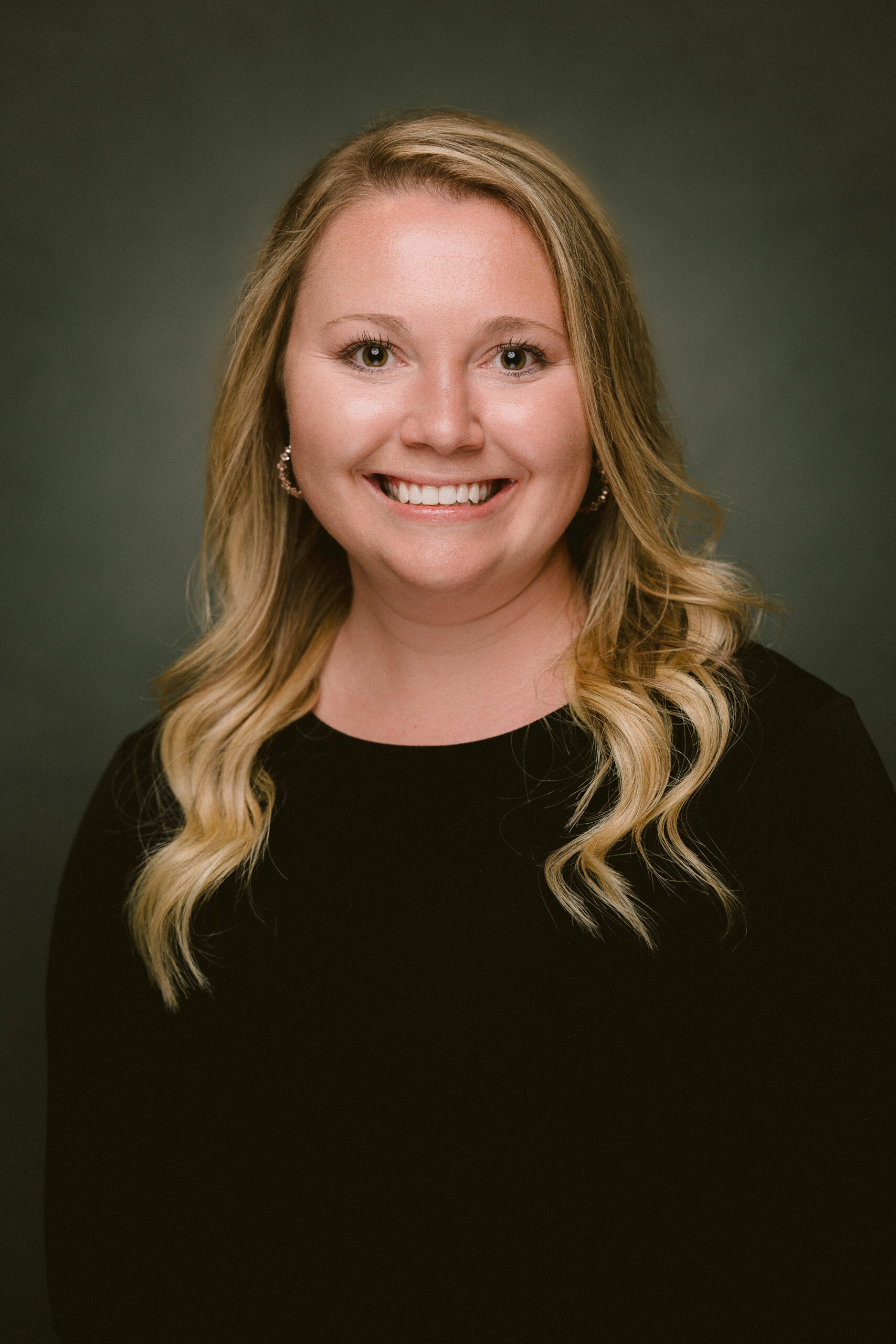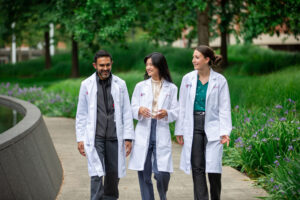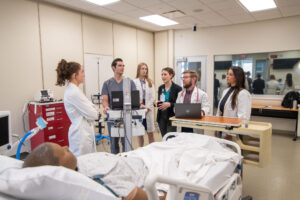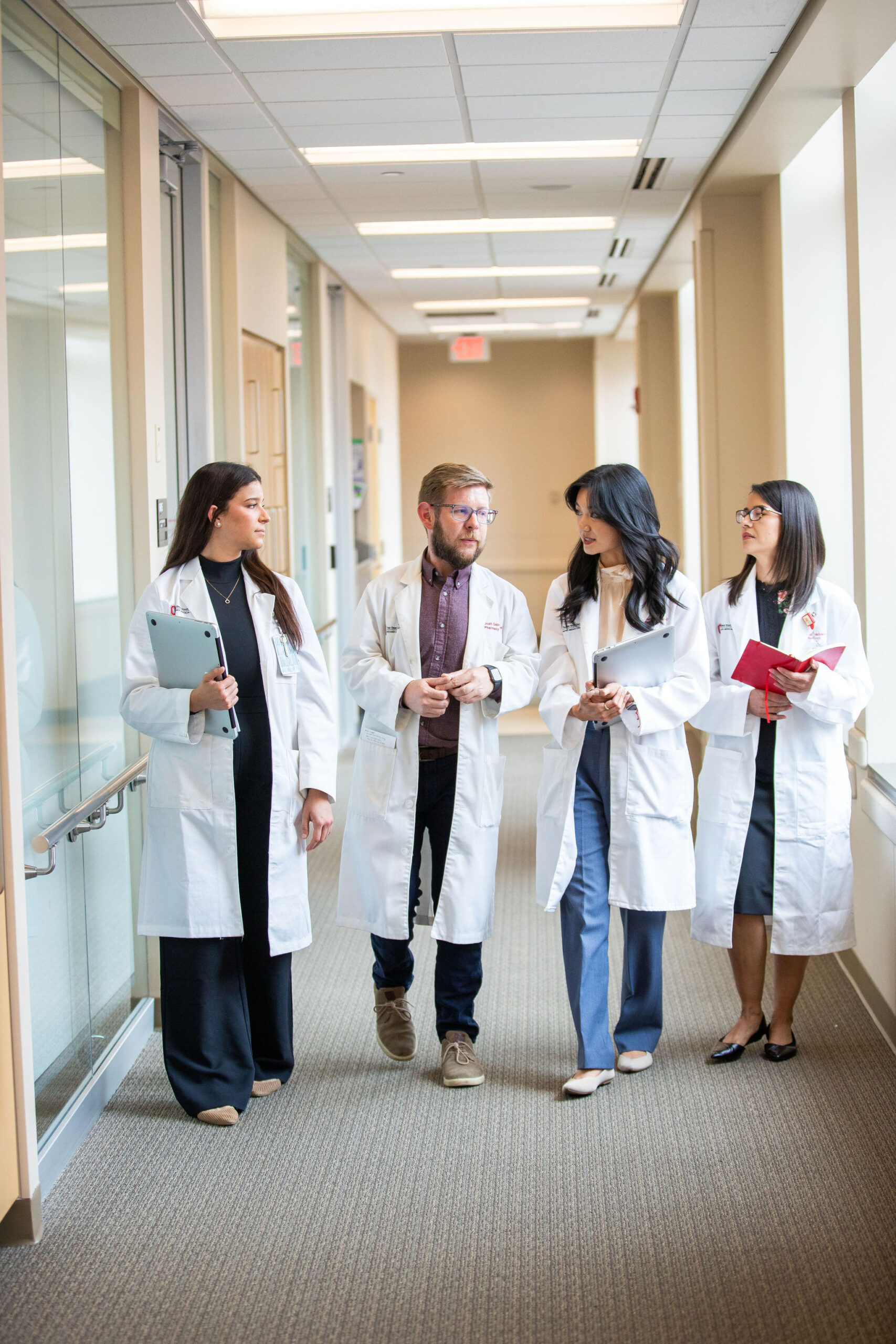PGY2 program
Residency Program Director
-

Lauren Vergara, PharmD, BCTXP
- Transplant Specialist, The Ohio State University Wexner Medical Center
- PGY2 Solid Organ Transplant Resident, The Ohio State University Wexner Medical Center
- PGY1 Resident, The Johns Hopkins Hospital
- PharmD, Ohio Northern University
Previous Year Residents
-
Johana Papanikolla, PharmD
Specialty Practice Pharmacist, Solid Organ Transplant - The Ohio State University Wexner Medical Center -
Paige Dunton, PharmD
Outpatient Transplant Pharmacist, Medical University of South Carolina, Charleston -
Jenna Ferrante
Clinical Pharmacy Specialist, Cleveland Clinic -
Kathryn Owen, PharmD
Clinical Pharmacy Specialist in Transplant, Methodist University Hospital, Memphis -
Corey Burrelli, PharmD, BCPS
Clinical Pharmacy Specialist, Solid Organ Transplant, University Hospitals Cleveland Medical Center -
Teresamari Pastrana-Camacho, PharmD, BCPS
Transplant Clinical Pharmacy Specialist, Jackson Memorial Hospital, Miami, Florida -
Abbie Leino, PharmD, BCPS
Clinical Pharmacy Specialist, Abdominal Transplantation, The Ohio State Univesity Wexner Medical Center -
Carly D’Agostino, PharmD, BCPS
Clinical Pharmacy Specialist, Solid Organ Transplant, Northwestern Medical Center, Chicago, Illinois -
Amanda Hulbert, PharmD, BCPS
Clinical Pharmacy Specialist, Solid Organ Transplant, Duke University Medical Center, Durham, North Carolina -
Erika Aldag, PharmD, BCPS
Clinical Pharmacy Specialist, Solid Organ Transplant, Aurora/St. Luke’s Medical Center, Milwaukee, Wisconsin
About the PGY2 Solid Organ Transplant Residency Program
Residency Sites
 As one of America’s top ranked academic medical centers, the mission of The Ohio State University Wexner Medical Center (OSUWMC) is to improve people’s lives through innovation in research, education, and patient care. OSUWMC is a 1,506-bed multihospital delivery system recognized in 2018 as one of “America’s Best Hospitals” for excellence in ten specialties by US News and World Report based on quality, outcomes, and reputation.
As one of America’s top ranked academic medical centers, the mission of The Ohio State University Wexner Medical Center (OSUWMC) is to improve people’s lives through innovation in research, education, and patient care. OSUWMC is a 1,506-bed multihospital delivery system recognized in 2018 as one of “America’s Best Hospitals” for excellence in ten specialties by US News and World Report based on quality, outcomes, and reputation.
Read about the sites
University Hospital (UH)
University Hospital (UH) is our flagship hospital with over 900 beds. UH is a major referral center for patients throughout Ohio and the Midwest, and is one of the busiest kidney and pancreas transplant centers in the world. UH is also an international center for neuromodulation research and neurological care. In addition, UH is a level 1 trauma center in addition to being the American Burn Associated verified adult burn center for the region.
The James Cancer Hospital and Solove Research Institute
The OSUCCC – James strives to create a cancer-free world by integrating scientific research with excellence in education and patient-centered care — a strategy that leads to better methods of prevention, detection and treatment. Ohio State is one of 51 National Cancer Institute (NCI)-designated Comprehensive Cancer Centers and one of only a few centers funded by the NCI to conduct both phase I and phase II clinical trials on novel anticancer drugs sponsored by the NCI. As the cancer program’s 356-bed adult patient-care component, The James is one of the top cancer hospitals in the nation as ranked by U.S. News & World Report and has achieved Magnet® designation, the highest honor an organization can receive for quality patient care and professional nursing practice. With 21 floors and more than 1.1 million square feet, The James is a transformational facility that fosters collaboration and integration of cancer research and clinical cancer care.
The Ross Heart Hospital
The Ross Heart Hospital is a leader in cardiology and heart surgery and is the only nationally ranked heart hospital in the area. Each floor of the 150-bed hospital is dedicated to a specific service, which helps us provide specialized care for every patient. The Ross is one of the largest centers for the implantation of LVAD devices in the world in addition to providing heart and lung transplants.
University Hospitals East (UHE)
University Hospitals East (UHE) blends the friendly atmosphere of a community hospital with the advantages of being a part of a major academic medical center. Located on the eastern edge of downtown Columbus, University Hospital East offers renowned Ohio State services in orthopedic care, emergency services, cancer care, addiction services, ear, nose and throat care, heart care, radiology and imaging services, rehabilitation and wound healing. University Hospital East has a 19 bed mixed medical/surgical ICU.
Harding Hospital
In addition, the OSUWMC boasts Harding Hospital, which offers comprehensive inpatient and outpatient mental and behavioral health services in addition to Dodd Hall, which is a nationally recognized and accredited rehabilitation program specializing in stroke, brain, and spinal cord rehabilitation.
The Brain and Spine Hospital
The Brain and Spine Hospital opened in the Fall of 2016 and is a state-of-the-art facility for the advanced management, care and healing of patients with neurological disorders.The hospital consists of 87 private beds and specialized units for stroke and neurovascular, neurotrauma, epilipsy, spine, chronic pain, neuromodulaton, multiple sclerosis, congnitive and movement disorders, as well as an innovative new model for acute spinal cord injuries.
The abdominal transplant clinic is located on the 11th floor of The Brain and Spine hospital. It is only a short, indoor walk from the inpatient transplant floor in University Hospital.
The Department of Pharmacy
The Department of Pharmacy at The OSUWMC is one of the largest in the country. With over 400 employees, and a practice model that includes both clinical pharmacy generalists and clinical pharmacy specialists, our goal is the provision of outstanding, state of the art care. We advise our staff on the best use of medications, develop safeguards for our patients to prevent medication errors and develop transformative pharmacy practice in health- systems. We are guided in this mission by our strategic plan that focuses on five key priorities: optimizing our pharmacy information system, refining our practice model, enhancing our medication safety program, establishing the pharmacy as a workplace of choice in Central Ohio and refining our academic relationships and department scholarship. Training future generations of pharmacists is a vital part of our mission. Our pharmacists serve as preceptors for our residency programs while providing experiential training for Doctor of Pharmacy (Pharm.D.) students. Our residency program has a 55-year tradition of excellence with our graduates being well-prepared to work at a high-level in a wide-variety of institutional and ambulatory patient care facilities. The Department of Pharmacy, in partnership with the OSU College of Pharmacy, strives to develop the skills of our residents and provide a residency program that is recognized nationally for the quality and excellence of its graduates.
Key Rotations/Experiences
 Patient care training is the backbone of this residency experience. The practice site is The Ohio State University Wexner Medical Center Health System including University Hospital, the Ross Heart Hospital, and the outpatient transplant clinic. This PGY2 residency is designed to develop clinical skills in the area of adult solid organ transplantation. Approximately 600 patients receive solid organ transplants (kidney, kidney/pancreas, liver, lung, and/or heart) at OSUWMC each year. Solid organ transplant patients are admitted to various transplant services throughout the hospital: 1) Transplant Surgery/Renal (kidney and/or pancreas transplant patients who are one year or less from transplant); 2) Transplant Surgery/Liver (liver transplant patients who are one year or less from transplant); 3) Congestive Heart Failure/Open Heart Surgery (all heart and lung transplants); 4) Hepatology (liver transplant patients readmitted after transplant) and 5) Transplant Medicine (kidney and/or pancreas transplant patients readmitted after transplant). Required rotations include kidney/pancreas transplant, liver transplant, and lung transplant. Elective rotations may include heart transplant, hepatology, pediatric transplant at Nationwide Children’s Hospital, and transplant infectious diseases. The resident will also complete a longitudinal rotation in the outpatient post- transplant clinics, assist in precepting pharmacy students and residents, and participate on various multi-disciplinary committees within the Comprehensive Transplant Center. The opportunity exists to deliver a didactic lecture at The Ohio State University College of Pharmacy. The resident will be expected to complete and publish at least one major research project. The program is intended to be flexible and can be modified depending on the individual resident’s interests and needs.
Patient care training is the backbone of this residency experience. The practice site is The Ohio State University Wexner Medical Center Health System including University Hospital, the Ross Heart Hospital, and the outpatient transplant clinic. This PGY2 residency is designed to develop clinical skills in the area of adult solid organ transplantation. Approximately 600 patients receive solid organ transplants (kidney, kidney/pancreas, liver, lung, and/or heart) at OSUWMC each year. Solid organ transplant patients are admitted to various transplant services throughout the hospital: 1) Transplant Surgery/Renal (kidney and/or pancreas transplant patients who are one year or less from transplant); 2) Transplant Surgery/Liver (liver transplant patients who are one year or less from transplant); 3) Congestive Heart Failure/Open Heart Surgery (all heart and lung transplants); 4) Hepatology (liver transplant patients readmitted after transplant) and 5) Transplant Medicine (kidney and/or pancreas transplant patients readmitted after transplant). Required rotations include kidney/pancreas transplant, liver transplant, and lung transplant. Elective rotations may include heart transplant, hepatology, pediatric transplant at Nationwide Children’s Hospital, and transplant infectious diseases. The resident will also complete a longitudinal rotation in the outpatient post- transplant clinics, assist in precepting pharmacy students and residents, and participate on various multi-disciplinary committees within the Comprehensive Transplant Center. The opportunity exists to deliver a didactic lecture at The Ohio State University College of Pharmacy. The resident will be expected to complete and publish at least one major research project. The program is intended to be flexible and can be modified depending on the individual resident’s interests and needs.
Key Preceptors
Pamela Burcham, PharmD, BCPS, BCTXP
Lung Transplantation
Tara Fallah, PharmD, BCTXP
Lung Transplantation
Kevin Kissling, PharmD, BCPS
Heart Transplantation
Melissa McGowan, PharmD
Abdominal Transplantation
Annelise Nolan, PharmD, BCPS, BCTXP
Abdominal Transplantation
Johanna Papanikolla, PharmD
Abdominal Transplantation
Erica Reed, PharmD, BCPS, BCIDP
Infectious Diseases
Megan Smetana, PharmD, BCPS, BCTXP
Hepatology
Jessica Smith, PharmD, MBA, BCIDP
Infectious Diseases
Bryant Summers, PharmD, BCTXP
Abdominal Transplantation
Nikki Tran, PharmD, BCIDP
Infectious Diseases
Lauren Vergara, PharmD, BCTXP
Abdominal Transplantation
Lynn Wardlow, PharmD, MBA, MS, BCPS, BCIDP, AAHIVP
Infectious Diseases
Holli Winters, PharmD, BCPS, BCTXP
Abdominal Transplantation
Selected Resident Research
- Impact of a pharmacist-led tacrolimus management protocol in the outpatient setting Owen K, Winters H, Palettas M, Witkowsky O. Impact of a pharmacist-led tacrolimus management protocol in the outpatient setting. J Am Pharm Assoc (2003). 2022 Nov-Dec;62(6):1912-1918. doi: 10.1016/j.japh.2022.06.007. Epub 2022 Jun 22. PMID: 35843802.
- Antithymocyte induction dosing and incidence of opportunistic viral infections using steroid-free maintenance immunosuppression Von Stein L, Leino AD, Pesavento T, Rajab A, Winters H. Antithymocyte induction dosing and incidence of opportunistic viral infections using steroid-free maintenance immunosuppression. Clin Transplant. 2021 Jan;35(1):e14102. doi: 10.1111/ctr.14102. Epub 2020 Dec 19. PMID: 32985025.
- Incidence of Cytomegalovirus Infection Among Liver Transplant Recipients Maintained on a Cyclosporine vs Tacrolimus-Based Immunosuppression Regimen Burrelli, C, Bradley, M, Pouch S, Elkhammas E, Winters H Presented at the Viral Conundrums Poster Abstract Sessions at the 2017 American Transplant Congress
- Virological Response at 4 Weeks with a Sofosbuvir-Based Antiviral Regimen in Liver Transplant Recipients with Recurrent Hepatitis C Pastrana-Camacho, Bradley, M, Mumtaz, K, Black, S, Winters, H Presented at the 2016 American Transplant Congress
- Infectious Complications with Plasmapheresis in Combination with Antithymocyte Globulin for the Treatment of Acute Rejeciton in Renal Transplantation Leino A, Hulbert A, Lehman A, Rajab A, Von Visger J, Winters H Presented at the American Transplant Congress 2015
- Incidence of Cytomegalovirus and Acute Rejection in D+/R- Kidney Transplant Patients on Valganciclovir Prophylaxis after Medication Dose Adjustments D’Agostino C, Delahunty A, Henry M, Theodoropoulos N, Abdel-Rasoul M, Winters H. Presented at the World Transplant Congress July 2014
- The utilization of sirolimus and the impact on wound-healing complications in obese kidney transplant recipients Hulbert AL, Delahunty AJ, Rajab A, Forbes RC, Winters H. Clinical Transplant:27(4):E521-E527, 2013.
Benefits and Additional Requirements
Application Deadline: January 3
We welcome applications from non-U.S. citizens who have a “green card” (permanent resident status) or a current visa valid through the entire duration of the residency program. The Ohio State University pharmacy residency programs are NOT able to sponsor visas for pharmacy residents (PGY1 or PGY2).
Start Date: July 1
Annual Salary- $54,000
Vacation Days- 10 days
Staffing Requirement- 20 weekends per year
Completion of a Major Research Project



You must be logged in to post a comment.